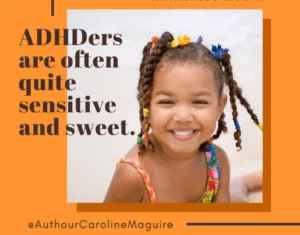Raising the Consistently Inconsistent Kid

One day last summer, my daughter arrived for her swim meet in great spirits, as if she could tackle anything. She danced around with her friends, red-cheeked with excitement. When her group was called, she got up on the block, adjusted her goggles, and swam faster than any other six-year-old. She was in high gear, revved with self-confidence. And most importantly, she seemed to be very present. She was her best self.
But at her next swim meet the very next day, she was not interested in racing. It was raining outside, and she decided she wanted to watch Cake Boss and eat Chinese food. After I pried her away from the TV and loaded her into the car, I sensed doom. All the way to the meet, she kept telling me that the race would be canceled. When we arrived, she did not frolic with her friends as she had the day before. Her mood was ill-tempered and stormy. When I saw her take the block, I knew she was going to hold back. She finished the race, but she didn’t make very good time. Immediately afterward, she picked a fight with one of her friends, and I had to separate them.
Dramatic Mood Swings
If you are a parent of a child with ADHD, this scene probably sounds very familiar to you. For ten years, I have worked with hundreds of frustrated parents who have relayed similar experiences. Their children are erratic and inconsistent, and they don’t know how to improve or control their children’s behavior. Like these other parents, you probably understand how hard it is to raise an unpredictable child. One day your child is brilliant and confident, and the next day, your child is a raging ball of dark emotion. You never know which version of your child will be showing up to the party. Your child’s dramatic mood swings and undesirable behavior may also be causing to you to feel a wide range of emotions: anger, shame, confusion, guilt, or hopelessness. I’m here to tell you that these feelings are very common.
Many of my clients have been in the exact same position as you are right now. One thing I often tell parents of children with ADHD is this: from now on, expect the unexpected. Accept the fact that your child is going to be a consistently inconsistent child for a very long time. Go through a grieving process, if you have to, in order to move forward. Most likely, your child’s challenging behavior will arrive at the wrong moments—when you are least equipped to handle the drama. Try to come up with some coping strategies to calm yourself down when these challenging days inevitably arise.

Begin the Change Process
After you have gained this knowledge and acceptance, you can begin the change process. Most inconsistent kids want to be good, but they don’t know how to be good. Ross Greene, a leading expert in child psychology, puts it this way: “Children exhibit challenging behavior when the demands being placed upon them outstrip the skills they have to respond adaptively to those demands.” In other words, when your child reacts explosively, your child lacks the skills needed to handle the situation. Inconsistent kids need help with building coping skills, seeing things from another’s perspective, and developing problem-solving strategies. These much-needed skills are called lagging skills.
Lagging Skills
One way you can identify your child’s lagging skills is by asking yourself the following question: “What is getting in the way of my child’s success?” Start by trying to figure out what the overall reasons are for your child’s inconsistency. Some kids freak out about timed events or tests. Some can’t handle peer pressure. Some don’t understand social boundaries. Some don’t know what to do when they make a mistake, and they fall apart and blow the rest of the race, recital, test, etc.
Ross Greene’s lagging skills assessment can help you identify your child’s lagging skills.



